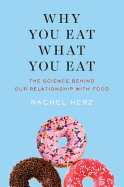
Food, along with sex, is key to the survival of humans and provides pleasure along with sustenance. Our relationship with food is exceptionally complex and influenced by a host of external factors. In Why You Eat What You Eat, neuroscientist Rachel Herz reveals the surprising reasons we decide what (and how much) to eat.
Herz identifies different types of tasters ("supertasters" are most likely to dislike strong flavors like cilantro, but are also less likely to become alcoholics, while sriracha-loving "non-tasters" who yearn for big flavor are more susceptible). Yet taste alone does not solely dictate our food choices. Smell is an important influencer, and the stronger the aroma of a food, the higher the satisfaction level and the less we will consume. The adage "our eyes are bigger than our stomachs" is true, so eating meals on small plates will satisfy our brains when the plate is empty. But Herz cautions against the "health halo effect"--if a snack promotes its health benefits too much, we will reach for seconds. Are organic food consumers healthier than the rest of us? Not necessarily, since the health benefits of organic food entitles consumers to choose decadent desserts along with their kale salad. Conversely, Herz discusses comfort food--satisfying but unhealthy--and how nostalgia and other factors (like a reaction to a sports game or the night of the 2016 presidential election) may tell our brains to shovel it in.
Using dozens of research studies, Herz provides readers with a greater awareness of the brain's complicated and contradictory relationship with food, and a roadmap to make smarter food choices down the road. --Frank Brasile, selection librarian, writer, editor

